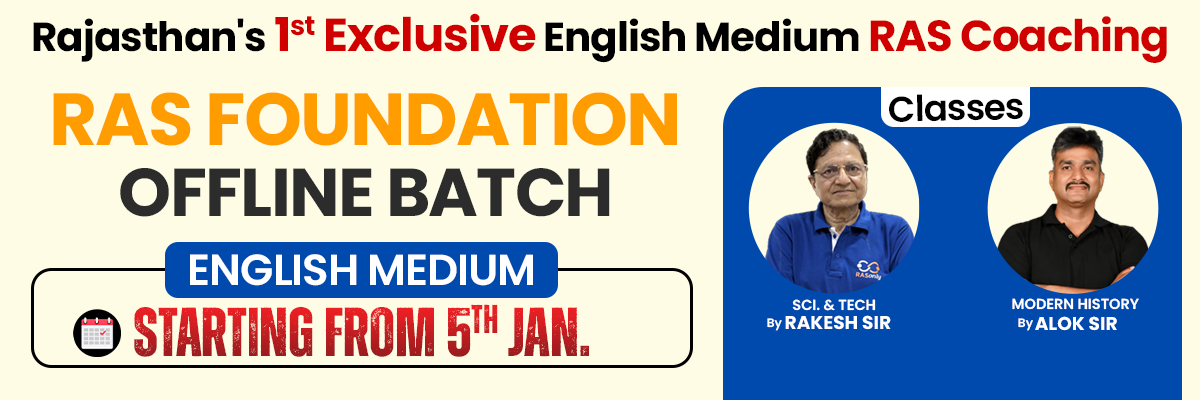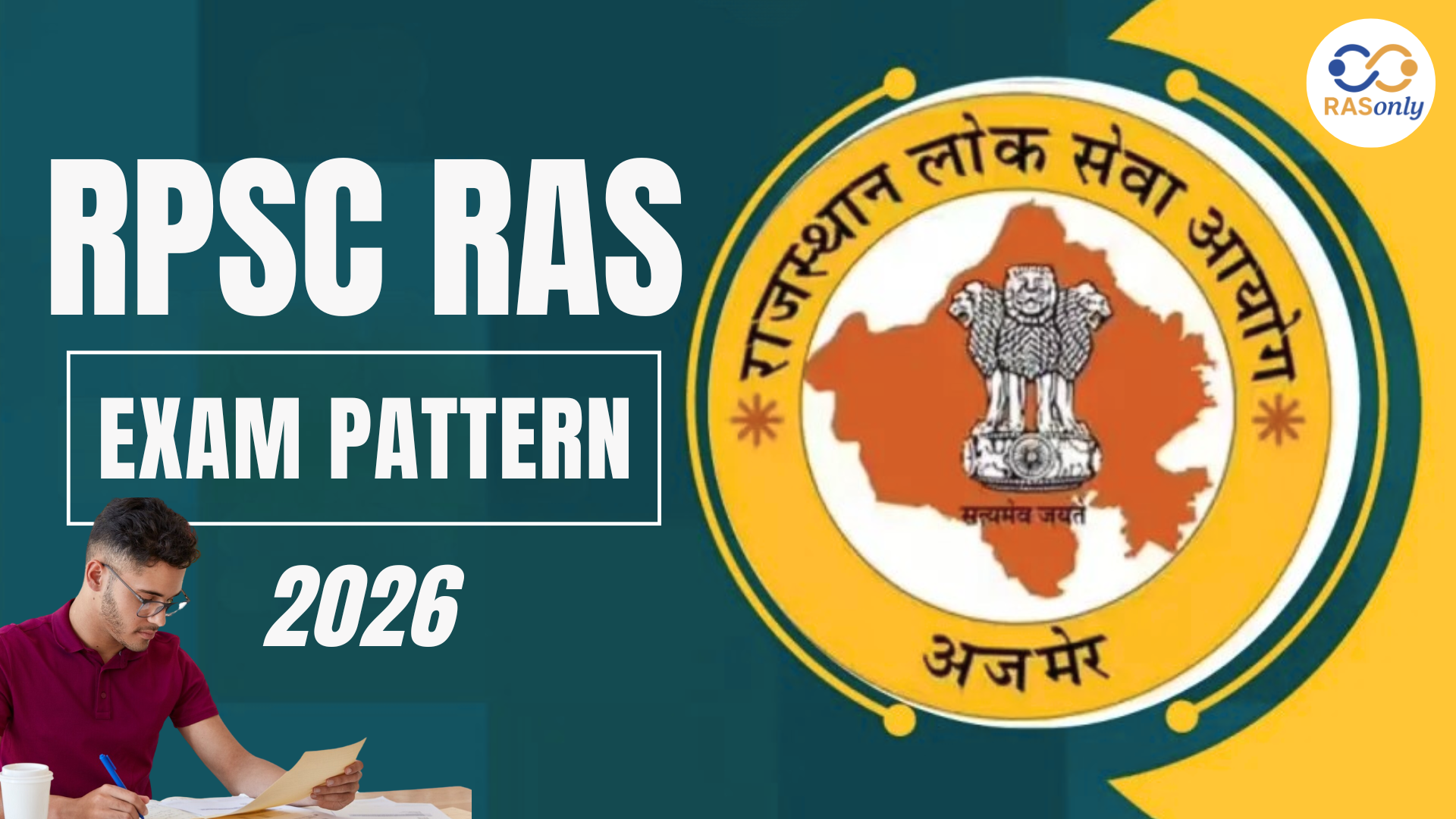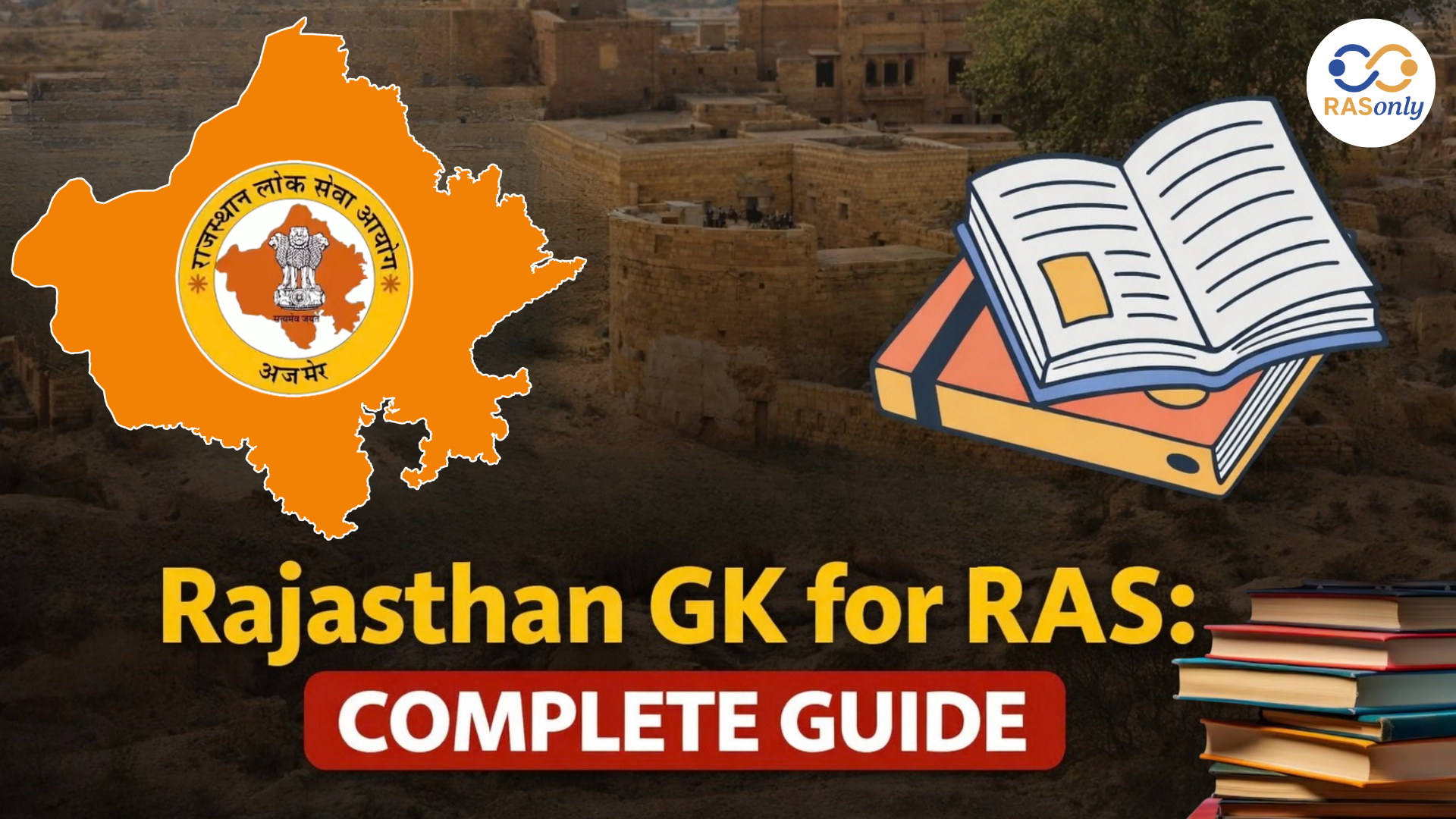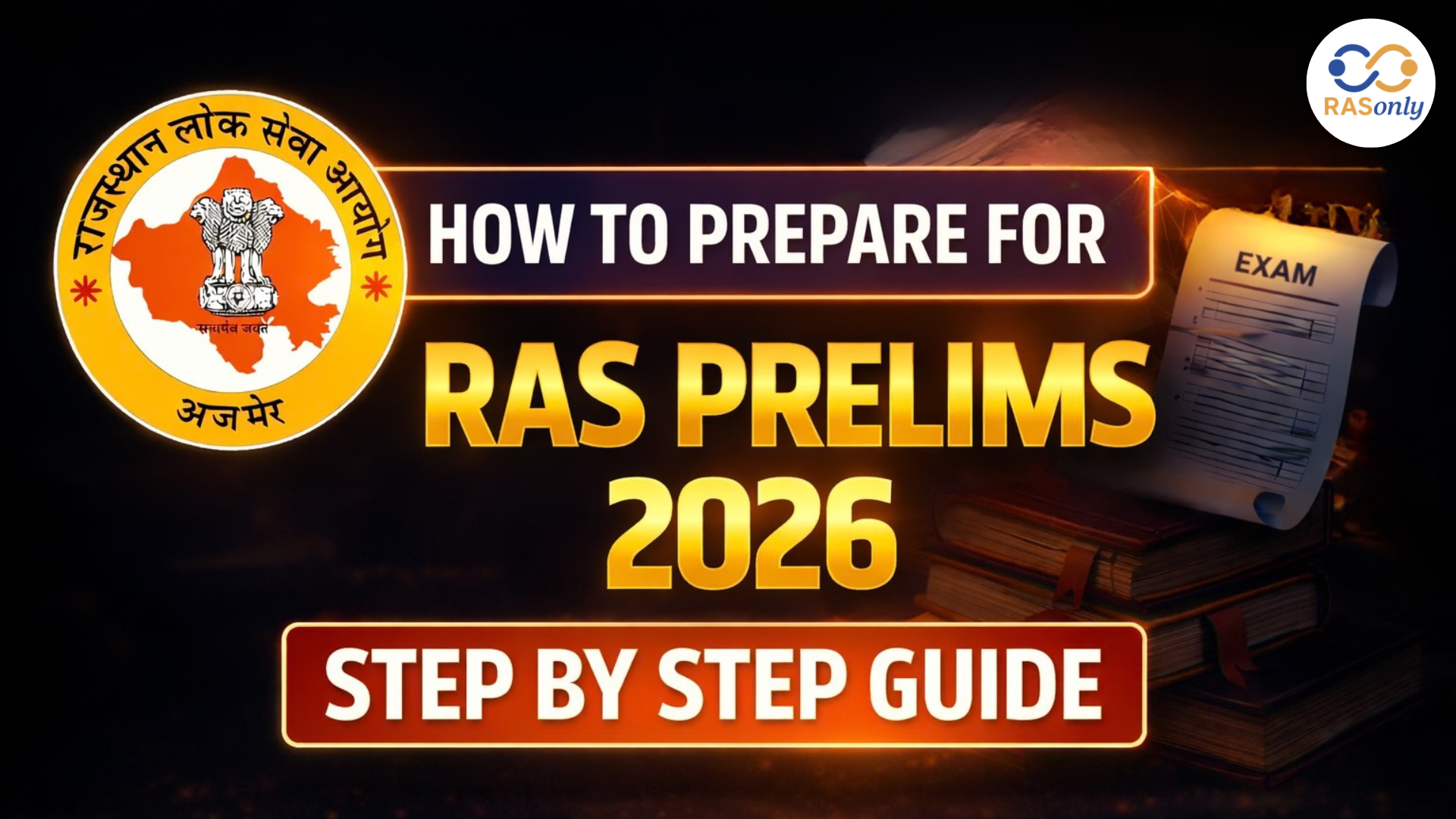RPSC RAS 2026 Subject Wise Exam Pattern for Prelims, Mains & Interview Details
- >
- Preparation Tips
- >
- How to Prepare for RAS Without Coaching?
How to Prepare for RAS Without Coaching?

Get in Touch with RASonly!

Preparing for the RAS exam without coaching is completely achievable with the right strategy and discipline. This guide explains the RAS exam structure, self-study advantages, essential resources, smart study planning, motivation techniques, and effective revision methods. It helps aspirants understand how to prepare independently, manage time efficiently, and stay focused while building confidence to crack the Rajasthan Administrative Services exam successfully through self-preparation.

The Rajasthan Administrative Services (RAS) exam is a dream goal for numerous candidates seeking admission into state administrative positions. Many RAS aspirants seek knowledge about whether studying independently could replace a formal coaching institute for exam success. Prepare for RAS Without Coaching is possible and effective when aspirants dedicate themselves to the process while utilizing proper resources. This blog examines how to succeed in RAS exams without traditional coaching by introducing wise preparation methods, significant study materials, and effective time planning approaches. The guide provides all the necessary resources for self-preparation of RAS, even if financial constraints limit your access to coaching or you prefer independent study.
Understanding the RAS Exam Structure
A basic understanding of the RAS exam structure should come first before beginning preparation strategies. Candidates seeking admission to the Rajasthan Administrative Services must overcome three sequential steps beginning with the Preliminary Exam, followed by the Mains Exam, and ending with the Interview. The examination structure divides testing into different skill sets during each stage.
- Preliminary Exam: Candidates need to complete two parts of the Preliminary exam, which include a General Studies subject-based assessment and the General Aptitude Test. The Prelims test functions to identify candidates suitable for Mains testing, which means students need to master the syllabus to advance correctly.
- Mains Exam: The Mains format consists of three papers, including General Studies alongside General Hindi and Rajasthan-specific subjects. Evaluation of candidates includes a structured analytical presentation of knowledge through essay-type responses. Preparation for the Mains stage needs extensive focus because of its challenges in answer writing and time management requirements.
- Interview (Personality Test): Candidates who successfully finish the Prelims and Mains tests will receive an invitation for the Interview process. The Interview phase assesses candidates through examination of their personality traits, together with communication skills and decision-making competencies, and administrative role fit. The interview demands detailed preparation about modern events, together with fundamental subject understanding and constant individual growth.
Self-Preparation: Is It Possible to Crack RAS Without Coaching?
The prospect of RAS examination preparation without traditional education makes many test-takers feel overwhelmed. With disciplined self-preparation, it becomes entirely possible to pass the RAS examination. The correct approach to resource utilization allows autonomous study to match or exceed the performance potential of structured guidance.
- Cost-Effective: Coaching institutions demand significant charges for their services that many students cannot afford. Self-preparation helps students avoid tuition costs because it enables them to access free and inexpensive online and offline resources.
- Flexible Learning Pace: Self-study delivers a prime advantage through its flexibility to choose a study schedule based on individual learning speed. Students who organize their study time can place major efforts toward difficult material without wasting time on topics they already master. Working students, along with professionals who carry multiple commitments, find this flexibility exceptionally valuable in self-study due to their demanding schedules.
- Personalized Strategy: By preparing yourself for study, you gain the ability to modify your educational plan according to your learning techniques. The study plan allows students to focus more time on subjects that demand concentration while shortening sessions devoted to familiar material. Standard coaching courses employ a single approach standard that might not serve every student well.
- Increased Self-Reliance: Personal preparation enables you to become more self-sufficient while developing your analytical abilities. Through self-preparation, you will develop abilities that allow you to assess problems and then create solutions using your best assets while adapting to weaknesses. The ability developed through self-preparation will prove crucial during any exam difficulties.
Essential Resources for RAS Preparation Without Coaching
The process of independent preparation enables you to develop essential skills for independent thinking while fostering personal reliance. Through self-preparation, you will develop abilities that allow you to assess problems and then create solutions using your best assets while adapting to weaknesses. The ability developed through self-preparation will prove crucial during any exam difficulties.
|
Resource Type |
Recommended Resources |
|
Books for RAS Preparation |
NCERT Books (Class 6-12), "Indian Polity" by M. Laxmikanth, "Modern History of India" by Bipin Chandra, "Geography of India" by Majid Husain, and Rajasthan-specific books. |
|
Online Platforms |
Educational YouTube channels, edtech apps providing free study materials, and other online platforms offering video lectures. |
|
Current Affairs Resources |
Online news portals, Rajasthan-specific news (e.g., Rajasthan Patrika), and government websites for state-specific updates. |
|
Mock Tests & Previous Papers |
Access to free and paid mock test series, previous years' RAS question papers available on educational websites and platforms. Download RAS Mock Tests Here |
Strategic Study Plan for RAS Preparation
The RAS exam preparation requires a firmly structured personal study plan that ensures effective preparation. Your self-preparation effort requires discipline through strategic planning to maximize study time effectiveness. The following steps describe how to make an effective study plan;
Break Down the Syllabus
The research for your study plan begins by completely grasping all content covered in the RAS Prelims and Mains assessments. Dividing the syllabus into smaller parts will allow you to concentrate on distinct topics daily. Arrange your study time into three main sections, including General Studies, Rajasthan-specific material, and General Hindi subjects, while ensuring sufficient attention for all subjects.
Allocate Time for Each Subject
You should use the subject syllabus to organize realistic periods according to your Subject strengths and weaknesses. The following approach will lead you through the process;
- General Studies: Focus on topics like History, Geography, Polity, and Economics. These subjects require deep understanding and regular revision.
- Rajasthan-Specific Topics: Allocate extra time to Rajasthan History, Culture, and Economy, as these are heavily focused on in both Prelims and Mains.
- Current Affairs: Dedicate a portion of your time every day to reading newspapers and current affairs magazines to stay updated on national and international issues.
- General Hindi: Regular practice of reading, writing, and comprehension is key.
Create a Daily Routine
A daily study routine is crucial for staying on track. Ensure your routine includes:
- Early Morning Sessions: Start with revision and tackle the most challenging subjects when your mind is fresh.
- Breaks and Downtime: Do not forget to take regular breaks to avoid burnout. Short breaks after every 2-3 hours of study will keep you refreshed.
- Consistent Time for Current Affairs: Set aside time daily to read newspapers and stay updated with current events, as this is crucial for both Prelims and Mains.
The following table provides a sample timetable, which can be altered by the candidates as per their personal preferences.
| Time Slot | Activity |
|---|---|
| 5:30 AM - 7:00 AM | Morning Revision: Go through notes, revise previous topics, and practice General Studies. |
| 7:00 AM - 8:00 AM | Current Affairs: Read newspapers, magazines, and make notes of important updates. |
| 8:00 AM - 9:00 AM | Breakfast & Break |
| 9:00 AM - 12:00 PM | Study Session 1: Focus on a specific subject (e.g., History or Geography). |
| 12:00 PM - 1:00 PM | Practice Test: Solve questions from mock tests or previous years' papers. |
| 1:00 PM - 2:00 PM | Lunch & Break |
| 2:00 PM - 4:00 PM | Study Session 2: Focus on Rajasthan-specific topics. |
| 4:00 PM - 5:00 PM | Physical Activity: Engage in exercise, meditation, or a walk to refresh your mind. |
| 5:00 PM - 7:00 PM | Study Session 3: Focus on General Hindi and practice writing, comprehension, and grammar. |
| 7:00 PM - 8:00 PM | Dinner & Break |
| 8:00 PM - 10:00 PM | Mock Test / Answer Writing Practice: Simulate exam conditions and practice writing structured answers. |
| 10:00 PM - 10:30 PM | Review & Planning for Next Day: Review the day's progress and make adjustments to the plan if needed. |
Practice Mock Tests
Mock tests enable you to determine your level of knowledge preparation and your ability to manage time when you take the exam. Schedule regular mock exams together with conditions that match actual tests to develop your confidence level. Check your errors in every test to identify and strengthen your weak areas.
How to Stay Motivated During Self-Preparation
Individual self-studying for RAS admissions requires extra determination because you lack the benefits of a coaching class structure. Preserving motivation serves as an essential requirement to maintain both successive advancement and final achievement. The following strategies will support your focus and energy levels during personal RAS preparation.
1. Stay Consistent with a Routine
The key factor to sustain motivation lies in establishing consistency. Having a schedule for each day establishes both structure and purpose that brings organization to every day. Utilizing your planned schedule on frustrating days will help you stay motivated even if you lack the energy for studying.
2. Celebrate Small Wins
You should enjoy moments of achievement before reaching the ultimate test results. Always express appreciation to yourself for every achievement along the way. Celebrate any achievement that progresses your education, including accomplishing curricular sections, along with achieving good marks in practice exams and maintaining your study plan over seven days.
3. Stay Positive with Self-Talk
Learning to control your thoughts about yourself will greatly strengthen your motivation. When you are stressed, return to the start of your journey to refocus yourself. Repetition of positive words and motivational inner talks helps you keep moving ahead. Success demands repeated, focused work to achieve in the long run.
4. Visualize Your Success
Visualization functions as an essential instrument that helps people stay motivated. Set aside a few minutes every day to create mental images of yourself achieving your goals in the RAS exam purposes from Prelims checkouts to Mains completions and interview entrance with confidence. Such visualization practices help you both increase your dedication to your objectives as well as remind you about the achievements that await you when you finish your journey.
5. Stay Inspired with Stories of Success
Hearing real stories of RAS exam passers who finished without receiving coaching serves as a powerful motivational force. Actual achievements prove to you that achieving your goal remains possible regardless of the obstacles you might face. The motivational stories serve to encourage goal persistence because they demonstrate how dedication leads to achievement.
Effective Note-Making and Revision Strategies
Candidates preparing for RAS without coaching need to develop clear notes and establish robust strategies for studying. Through effective note organization, students can enhance their learning efficiency and get quick access during exam preparation and revision sessions through efficient material retention over extended periods. The following is an example of note-making for the topic, Indian Constitution;
| Topic | Details |
|---|---|
| 1. Overview of Fundamental Rights | Part III of the Indian Constitution Guarantees basic rights to citizens Available to all individuals (Citizens & Non-Citizens) Six Fundamental Rights (Article 12-35) |
| 2. List of Fundamental Rights | Right to Equality = Article 14-18 Right to Freedom = Article 19-22 Right Against Exploitation = Article 23-24 Right to Freedom of Religion = Article 25-28 Cultural and Educational Rights = Article 29-30 Right to Constitutional Remedies = Article 32 |
| 3. Key Points to Remember | Article 13: Laws inconsistent with Fundamental Rights are void. Suspension during Emergency (Article 359): Rights can be suspended during a National Emergency, except for Articles 20 and 21. Positive vs. Negative Rights: Negative Rights: Right against exploitation (Article 23, 24). Positive Rights: Right to education (Article 21A). |
| 4. Related Cases | Kesavananda Bharati Case (1973): Established the "basic structure doctrine" — Fundamental Rights cannot be amended to alter the basic structure of the Constitution. Maneka Gandhi v. Union of India (1978): Expanded the scope of Article 21 (Right to Life and Personal Liberty), ensuring that the procedure established by law must be just, fair, and reasonable. |
Conclusion
The right mindset, combined with committed effort, enables students to succeed through self-preparation for the RAS exam without external coaching assistance. The path to join Rajasthan's administrative services becomes achievable through individual study planning, together with optimal resource selection, coupled with sustained motivation and strategic note practices, and consistent revision sessions. The organization that coaching provides gives way to self-preparation, which brings both adaptability and customized learning methods, leading to a rewarding and powerful experience. Success in the RAS exam becomes achievable through discipline and perseverance, and strategic planning.
FAQs
Post Category
- RAS Salary
- Result
- RAS Admit Card
- RAS Job
- RAS Cutoff
- Preparation Tips
- RAS Answer Key
- RAS Exam Analysis
- RAS Syllabus
- RAS Previous Year Papers
- RPSC RAS Exam Pattern
- RAS Interview
- RAS Mains Exam Date
- RAS Vacancy
- RAS Test Series
- RAS Best Books
- RAS Preparation Resources
- RAS Coaching Centre
- History
- Polity
- Geography
- Economics
- Science
- Art and Culture
- RPSC RAS Application Form
- RPSC RAS Notification
RASonly Interview Guidance Program

Mr. Ashok Jain
Ex-Chief Secretary Govt of Rajasthan
- IAS officer of the 1981 batch, Rajasthan cadre.
- Passionate about mentoring the next generation of RAS officers with real-world insights.
- Got retired in Dec 2017 from the post of Chief Secretary of the state of Rajasthan.

Mr. Guru Charan Rai
Ex-ASP / SP in Jaisalmer
- Guru Charan Rai, IPS (Retd), retired as Inspector General of Police (Security), Rajasthan, Jaipur in 2017.
- Served as ASP and SP in Jaisalmer, Nagaur, Sri Ganganagar, Sawai Madhopur, Dausa, Sikar, and Karauli.
- He also held key positions as DIGP and IGP in the Law and Order division.

Mr. Rakesh Verma
Ex-IAS Officer, B.Tech, MBA, and M.A. (Economics)
- IAS officer of the 1981 batch and retired in Chief Secretary Rank.
- Civil servant of high repute and vast experience.
- Has been teaching UPSC CSE subjects for the last six years.
Related Post
Daily Current Affairs for RAS Exam Preparation 2026

Rajasthan Mines & RSMML win Best Pavilion at India...
February 10, 2026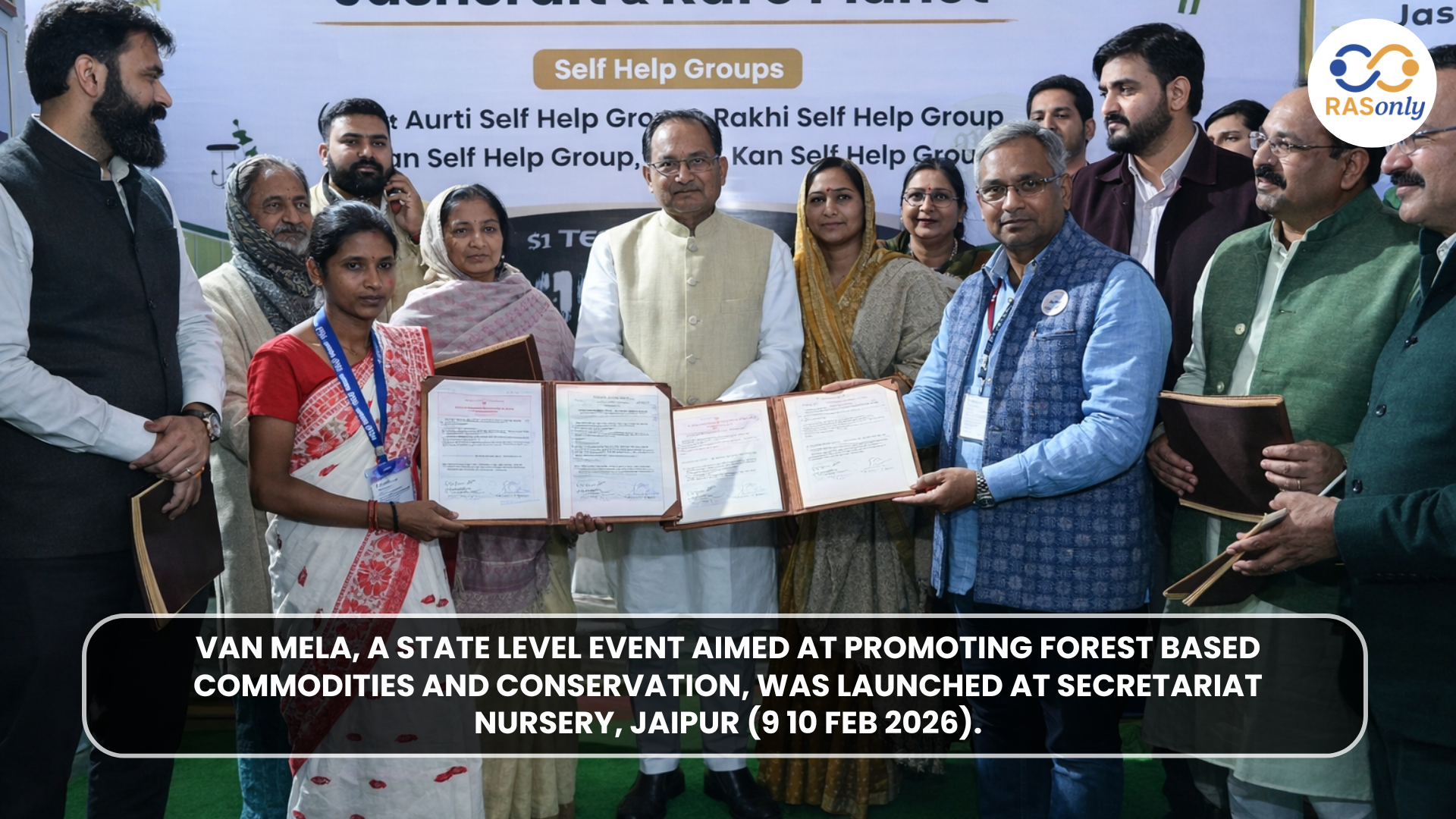
Rajasthan’s state-level Van Mela inaugurated in Jaipur
February 10, 2026
Shrinimbeshwar Mahadev Animal Fair returns to Sanderav after 33...
February 10, 2026
RSPCB signs MoUs with IIT Jodhpur & MNIT Jaipur...
February 10, 2026👉🏻 Register Today to Join Classes! 👍🏻
- Team RASOnly -
🎯 Benefits of RASOnly Coaching:
- ✅ 1:1 Mentorship with RAS Officers
- ✅ Experienced and Expert Faculty
- ✅ Free Library Access
- ✅ Daily Minimum 4 Hours Must
- ✅ Comprehensive Study Material
- ✅ Regular Tests & Performance Analysis
- ✅ Personalized Guidance & Doubt Solving
- ✅ Online & Offline Class Options
- ✅ Affordable Fees with Quality Education
Key Highlights:
- 👉🏻 3-Day Refund Policy
- 👉🏻 New Batch Starting from 04 August
- 👉🏻 Registration Amount: Only ₹1000




